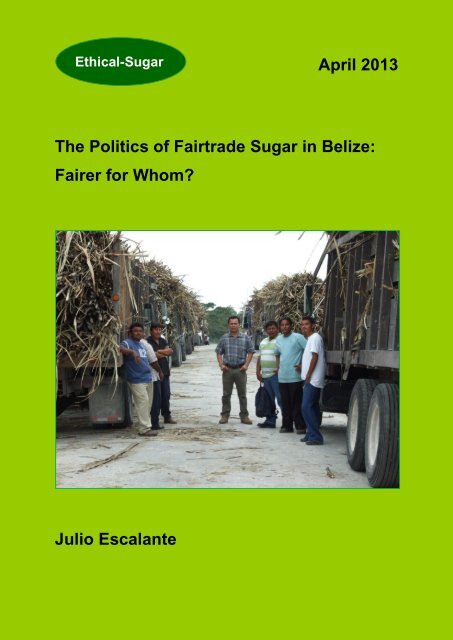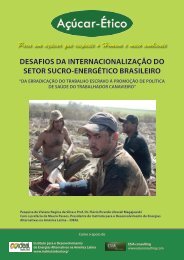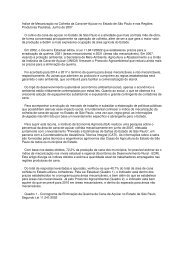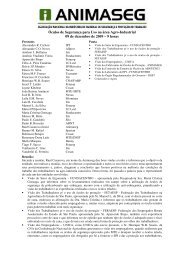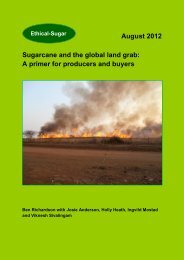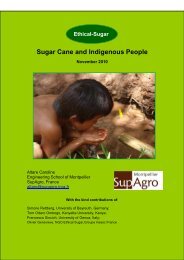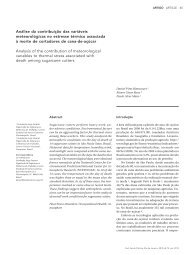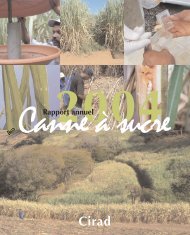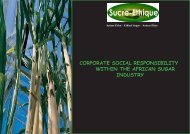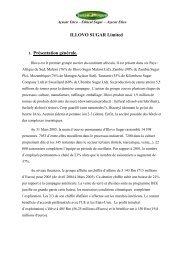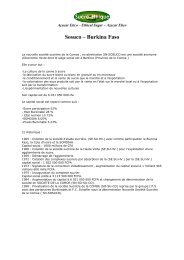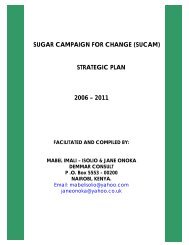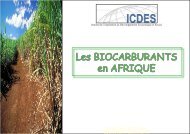April 2013 The Politics of Fairtrade Sugar in Belize ... - Sucre Ethique
April 2013 The Politics of Fairtrade Sugar in Belize ... - Sucre Ethique
April 2013 The Politics of Fairtrade Sugar in Belize ... - Sucre Ethique
Create successful ePaper yourself
Turn your PDF publications into a flip-book with our unique Google optimized e-Paper software.
Ethical-<strong>Sugar</strong><br />
<strong>April</strong> <strong>2013</strong><br />
<strong>The</strong> <strong>Politics</strong> <strong>of</strong> <strong>Fairtrade</strong> <strong>Sugar</strong> <strong>in</strong> <strong>Belize</strong>:<br />
Fairer for Whom?<br />
Julio Escalante
2<br />
Executive Summary<br />
From 2006, the guaranteed prices that the European Union (EU) paid to former British colonies for<br />
their sugar exports were first reduced and then abruptly ended. This system was known as the <strong>Sugar</strong><br />
Protocol and its annulment has transformed the <strong>in</strong>ternational sugar trade, especially for those African,<br />
Pacific and Caribbean countries who were part <strong>of</strong> the orig<strong>in</strong>al agreement.<br />
For <strong>Belize</strong>, the certification <strong>of</strong> their <strong>in</strong>dependent cane farmers by the <strong>Fairtrade</strong> Labell<strong>in</strong>g Organisation<br />
was seen as one way to target ‘value added’ luxury markets <strong>in</strong>stead <strong>of</strong> undifferentiated and more<br />
volatile bulk markets. An agreement was made with Tate & Lyle <strong>in</strong> 2008 under which the company<br />
would ref<strong>in</strong>e raw sugar from <strong>Belize</strong> and transfer a premium to cane farmers as a condition <strong>of</strong> us<strong>in</strong>g the<br />
<strong>Fairtrade</strong> label. At the time, this was the biggest <strong>Fairtrade</strong> commitment undertaken by any<br />
corporation <strong>in</strong> the world.<br />
Based on fieldwork undertaken <strong>in</strong> <strong>Belize</strong> dur<strong>in</strong>g 2010 and 2012 as part <strong>of</strong> a doctoral thesis on sugar<br />
<strong>in</strong>dustry adaptation, this report asks about the difference <strong>Fairtrade</strong> certification has made to the<br />
livelihoods <strong>of</strong> the 6,000 cane farmers.<br />
Two areas have dom<strong>in</strong>ated the spend<strong>in</strong>g <strong>of</strong> the <strong>Fairtrade</strong> premium: environmental management <strong>in</strong> the<br />
field and basic service provision <strong>in</strong> the cane-grow<strong>in</strong>g communities. <strong>The</strong> <strong>Fairtrade</strong> organisation has<br />
had a strong <strong>in</strong>fluence <strong>in</strong> determ<strong>in</strong><strong>in</strong>g this agenda and has <strong>in</strong>troduced new <strong>in</strong>itiatives like a pest<br />
control systems and rehabilitation <strong>of</strong> education facilities. Yet cane farmers rema<strong>in</strong> unconv<strong>in</strong>ced that<br />
this is really benefitt<strong>in</strong>g them, as some <strong>of</strong> their costs have <strong>in</strong>creased as a result <strong>of</strong> new agrochemical<br />
requirements and the community projects have not addressed their own immediate needs. Perhaps<br />
the greatest difference made by <strong>Fairtrade</strong> has been reform to the <strong>Belize</strong> <strong>Sugar</strong> Cane Farmers<br />
Association, which was briefly decertified for mismanagement <strong>of</strong> the <strong>Fairtrade</strong> premium, although<br />
aga<strong>in</strong>, some cane farmers still allege that self-serv<strong>in</strong>g <strong>in</strong>terests are at work.<br />
It is important to consider certification <strong>in</strong> context. <strong>Fairtrade</strong> certification <strong>in</strong> the <strong>Belize</strong>an sugar <strong>in</strong>dustry<br />
has allowed cane farmers, via their association, to r<strong>in</strong>gfence a significant portion <strong>of</strong> the value <strong>of</strong> UK<br />
retail sugar. However, the <strong>Fairtrade</strong> premiums have not <strong>of</strong>fset losses <strong>in</strong> the real price <strong>of</strong> raw sugar<br />
received by <strong>Belize</strong>, which have tumbled as a result <strong>of</strong> EU reform. Moreover, the cane farmers have<br />
become deeply dependent on one firm, American <strong>Sugar</strong> Ref<strong>in</strong><strong>in</strong>g, which bought Tate & Lyle’s sugar<br />
division and <strong>Belize</strong> <strong>Sugar</strong> Industries Ltd mean<strong>in</strong>g that it now controls the mill and ref<strong>in</strong>ery both sides<br />
<strong>of</strong> the Atlantic.<br />
In short, while <strong>Fairtrade</strong> br<strong>in</strong>gs benefits, they are <strong>in</strong>sufficient <strong>in</strong> stabilis<strong>in</strong>g precarious livelihoods when<br />
understood <strong>in</strong> their broader economic context.
1960<br />
1962<br />
1964<br />
1966<br />
1968<br />
1970<br />
1972<br />
1974<br />
1976<br />
1978<br />
1980<br />
1982<br />
1984<br />
1986<br />
1988<br />
1990<br />
1992<br />
1994<br />
1996<br />
1998<br />
2000<br />
2002<br />
2004<br />
2006<br />
2008<br />
2010<br />
2012<br />
US cents/kg<br />
3<br />
Introduction<br />
From 2006, the guaranteed prices that the European Union (EU) paid to former British colonies for<br />
their sugar exports were first reduced and then abruptly ended. This system was known as the <strong>Sugar</strong><br />
Protocol and its annulment has transformed the <strong>in</strong>ternational sugar trade, especially for those African,<br />
Pacific and Caribbean countries who were part <strong>of</strong> the orig<strong>in</strong>al agreement. <strong>The</strong> EU sugar reform has<br />
prompted mult<strong>in</strong>ational corporations grow<strong>in</strong>g and ref<strong>in</strong><strong>in</strong>g sugar to seek new bus<strong>in</strong>ess strategies, such<br />
as corporate consolidation and vertical <strong>in</strong>tegration. <strong>The</strong>se changes are similar to those that occurred<br />
<strong>in</strong> the supply cha<strong>in</strong> for c<strong>of</strong>fee after the dis<strong>in</strong>tegration <strong>of</strong> the International C<strong>of</strong>fee Agreement <strong>in</strong> 1989. In<br />
this <strong>in</strong>stance, a world glut caused a plunge <strong>in</strong> c<strong>of</strong>fee prices and had a devastat<strong>in</strong>g effect on rural<br />
economies dependent on c<strong>of</strong>fee bean production. Similarly for sugar, the world market here has also<br />
been punctuated by booms and busts. In a country like <strong>Belize</strong>, with thousands <strong>of</strong> people dependent<br />
on the export <strong>of</strong> sugar, this presented a daunt<strong>in</strong>g situation. Without access to stable and<br />
remunerative markets – a role which the EU traditionally served for countries like them – a reliance on<br />
volatile and typically low world prices awaited.<br />
<strong>The</strong> European Union and World Market Compared (Real US$, 2005)<br />
160<br />
140<br />
120<br />
100<br />
80<br />
60<br />
40<br />
20<br />
0<br />
European Union, real<br />
World, real<br />
Source: World Bank Commodities Database
4<br />
One <strong>of</strong> the major corporate developments <strong>in</strong> the global sugar <strong>in</strong>dustry has been the sale by the UK<br />
company Tate & Lyle <strong>of</strong> its sugar division to American <strong>Sugar</strong> Ref<strong>in</strong><strong>in</strong>g (ASR); the world’s largest<br />
ref<strong>in</strong><strong>in</strong>g company and a subsidiary <strong>of</strong> the Florida sugar empire built up by the Fanjul brothers. In turn,<br />
ASR then acquired a controll<strong>in</strong>g stake <strong>in</strong> <strong>Belize</strong> <strong>Sugar</strong> Industries (BSI), the owner <strong>of</strong> the only sugar<br />
mill <strong>in</strong> <strong>Belize</strong>. This was notable s<strong>in</strong>ce a few years prior to this, almost 6,000 <strong>in</strong>dependent cane<br />
farmers who work <strong>in</strong> <strong>Belize</strong> – grouped together by the <strong>Belize</strong> <strong>Sugar</strong> Cane Farmers Association<br />
(BSCFA) – had been certified by the <strong>Fairtrade</strong> Labell<strong>in</strong>g Organisation. This high degree <strong>of</strong><br />
mult<strong>in</strong>ational corporate control over the <strong>Fairtrade</strong> supply cha<strong>in</strong> is someth<strong>in</strong>g the report turns to later.<br />
<strong>The</strong> certification itself meant that the raw sugar exported from <strong>Belize</strong> to the UK would be sold on the<br />
supermarket shelves under the Tate & Lyle brand (which was reta<strong>in</strong>ed by ASR) but now with a<br />
<strong>Fairtrade</strong> logo attached. At the time, this was the biggest <strong>Fairtrade</strong> commitment undertaken by any<br />
corporation <strong>in</strong> the world and posited as a way for countries suffer<strong>in</strong>g the fallout <strong>of</strong> EU sugar reform to<br />
target ‘value added’ luxury markets <strong>in</strong>stead <strong>of</strong> undifferentiated bulk markets (Agritrade 2008).<br />
From the <strong>Belize</strong>an po<strong>in</strong>t <strong>of</strong> view, the benefit <strong>of</strong> this was to shore up a long-term supply arrangement<br />
with its biggest buyer whilst also allow<strong>in</strong>g a <strong>Fairtrade</strong> premium <strong>of</strong> $60 a tonne to be sent back to the<br />
farmers to <strong>in</strong>vest <strong>in</strong> agronomic and social projects. Together, these would hopefully mitigate the<br />
reduced and volatile market prices that country would now be exposed to (unlike other <strong>Fairtrade</strong><br />
commodities, there is no m<strong>in</strong>imum price set for <strong>Fairtrade</strong> sugar purchases, so there is still no<br />
protection from downward trends <strong>in</strong> this respect). From the po<strong>in</strong>t <strong>of</strong> view <strong>of</strong> the ref<strong>in</strong>er, the switch to<br />
<strong>Fairtrade</strong> would similarly allow them to secure supplies <strong>of</strong> raw sugar, particularly important at a time<br />
when prices would become more volatile. <strong>The</strong>y would also allow the Tate & Lyle brand to project itself<br />
<strong>in</strong> a more positive light – as seen <strong>in</strong> the <strong>Fairtrade</strong> advertis<strong>in</strong>g campaign which referred to the company<br />
as ‘Tate & Smile’ – and thereby appeal to customers as well as ‘green<strong>in</strong>g’ the corporate image.<br />
However, the strategy <strong>of</strong> us<strong>in</strong>g <strong>Fairtrade</strong> certification as a means <strong>of</strong> development has not been<br />
without its critics. In terms <strong>of</strong> its immediate livelihood impacts, Jaffee (2007) found <strong>in</strong> the c<strong>of</strong>fee<br />
<strong>in</strong>dustry that while <strong>Fairtrade</strong> certification did have a positive <strong>in</strong>come-effect for farmers, the overall<br />
benefits were slight given the ris<strong>in</strong>g costs that many faced at the same time. Consider<strong>in</strong>g<br />
development <strong>in</strong> the sense <strong>of</strong> a broader economic transformation, LeClair (2002) argued that <strong>Fairtrade</strong><br />
“retards the diversification <strong>of</strong> production that is fundamentally necessary for the economic<br />
advancement <strong>of</strong> develop<strong>in</strong>g countries [and] promotes cont<strong>in</strong>ued reliance on products that are<br />
arguably poor prospects <strong>in</strong> the long-run”. F<strong>in</strong>ally, Fridell (2007) has questioned the <strong>in</strong>clusiveness <strong>of</strong><br />
certification <strong>in</strong>itiatives like <strong>Fairtrade</strong>, which are ultimately targeted at market niches, compared to<br />
state-governed price management regimes like <strong>in</strong>ternational commodity agreements and national<br />
price floors. This also plays <strong>in</strong>to the political consciousness attached to <strong>Fairtrade</strong>, which might be<br />
better seen as a form <strong>of</strong> middle-class conspicuous consumption steadily be<strong>in</strong>g co-opted by agri-food
5<br />
corporations, rather than an expression <strong>of</strong> solidarity for the empowerment <strong>of</strong> Third World farmers<br />
(Fridell, 2007).<br />
<strong>The</strong>se criticisms pose a number <strong>of</strong> questions for this case: have <strong>Belize</strong>an cane farmers become<br />
locked <strong>in</strong>to sugar <strong>in</strong>stead <strong>of</strong> be<strong>in</strong>g helped out <strong>of</strong> it? What k<strong>in</strong>d <strong>of</strong> politics has been forgone by pursu<strong>in</strong>g<br />
an arrangement mapped out by mult<strong>in</strong>ational companies and NGOs? And who has benefitted from<br />
the <strong>in</strong>troduction <strong>of</strong> <strong>Fairtrade</strong> <strong>in</strong> the <strong>Belize</strong>an sugar <strong>in</strong>dustry? Based on fieldwork undertaken <strong>in</strong> <strong>Belize</strong><br />
dur<strong>in</strong>g 2010 and 2012 as part <strong>of</strong> a doctoral thesis on sugar <strong>in</strong>dustry adaptation, this report seeks to<br />
address these questions.<br />
Fair Trade or Foul: Whose Perspective Matters?<br />
In assess<strong>in</strong>g the merits <strong>of</strong> <strong>Fairtrade</strong>, it is important to disaggregate the <strong>Belize</strong>an sugar <strong>in</strong>dustry and<br />
consider the different groups and perspectives <strong>in</strong>volved. First is the sugar mill, formerly owned by the<br />
worker-controlled <strong>Belize</strong> <strong>Sugar</strong> Industries, but now taken over by the mult<strong>in</strong>ational company ASR.<br />
When <strong>Fairtrade</strong> certification was first <strong>in</strong>troduced <strong>in</strong> the <strong>Belize</strong> sugar <strong>in</strong>dustry <strong>in</strong> February 2008, the<br />
BSI’s then Chairman, Barry Newton, expressed concern that the premiums would not be <strong>in</strong>vested <strong>in</strong><br />
bus<strong>in</strong>ess improvements like mach<strong>in</strong>ery and tra<strong>in</strong><strong>in</strong>g but <strong>in</strong>stead <strong>in</strong> adm<strong>in</strong>istration costs and new forms<br />
<strong>of</strong> subsidisation. In his words, this would not change the “dependency culture and operat<strong>in</strong>g<br />
dynamics <strong>of</strong> [the] cane farm<strong>in</strong>g sector” (Newton, 2008). <strong>The</strong> BSI’s own attempts to improve farmer<br />
competitiveness, however, have not been without their problems. In 2009, cane farmers reacted with<br />
hostility to the <strong>in</strong>troduction <strong>of</strong> equipment to sample the sucrose content <strong>of</strong> the cane, which they<br />
believed would lower the prices they were paid by the sugar mill. In the ensu<strong>in</strong>g protests, one farmer,<br />
Atanacio Gutierrez, was shot dead and others <strong>in</strong>jured <strong>in</strong> clashes with police forces. As one cane<br />
farmer put it <strong>in</strong> an <strong>in</strong>terview: “you don’t play with the daily bread <strong>of</strong> a farmer”.<br />
<strong>The</strong> second group is the <strong>Belize</strong> <strong>Sugar</strong> Cane Farmers Association (BSCFA), whose functions <strong>in</strong>clude<br />
the provision <strong>of</strong> agrochemicals to members on credit/discounted prices and implement<strong>in</strong>g practices to<br />
improve the production, harvest and delivery <strong>of</strong> sugar cane. It is this organisation which is certified by<br />
the <strong>Fairtrade</strong> Labell<strong>in</strong>g Organisation and thus <strong>in</strong> control <strong>of</strong> manag<strong>in</strong>g the premiums. Accord<strong>in</strong>g to Mr<br />
Brown (pseudonym), a senior <strong>of</strong>ficial <strong>of</strong> the BSCFA, <strong>Fairtrade</strong> was a “bless<strong>in</strong>g for cane farmers”. He<br />
stated that with the premiums several beneficial programmes were undertaken, especially towards<br />
upgrad<strong>in</strong>g cane fields <strong>in</strong> order to improve cane quality and the livelihoods <strong>of</strong> the surround<strong>in</strong>g<br />
communities <strong>in</strong> the <strong>Sugar</strong> Belt. Yet the relationship between BSCFA and <strong>Fairtrade</strong> has not been<br />
smooth. Just over a year after the BSCFA was certified it was then suspended for a litany <strong>of</strong> noncompliances<br />
with the <strong>Fairtrade</strong> standard. <strong>The</strong>se related to mismanagement <strong>of</strong> the premium – totall<strong>in</strong>g<br />
almost US$4m <strong>in</strong> the first year – and a lack <strong>of</strong> accountability <strong>in</strong> the govern<strong>in</strong>g committees. <strong>The</strong><br />
suspension has s<strong>in</strong>ce been lifted follow<strong>in</strong>g the creation <strong>of</strong> an Environmental Department and Projects
6<br />
Department with<strong>in</strong> BSCFA and most importantly, policies and procedures for payments. Certification<br />
should now run until February 2014.<br />
Third, there are the cane farmers themselves. Dur<strong>in</strong>g fieldwork carried out <strong>in</strong> the country, it was<br />
noticeable that unlike the two parties above, cane farmers had little knowledge about <strong>Fairtrade</strong>. Most<br />
<strong>of</strong> them were only aware that when their sugar was sold abroad, it earned an extra amount <strong>in</strong> dollars<br />
that was a "prize" for them. From their perspective, these monies were supposed to serve as a price<br />
"top-up" and not for social programmes, which for some participants were seen a waste <strong>of</strong> money and<br />
time. <strong>The</strong> relationship with BSCFA is also important. In the beg<strong>in</strong>n<strong>in</strong>g many cane farmers were<br />
aga<strong>in</strong>st <strong>Fairtrade</strong> fund<strong>in</strong>g be<strong>in</strong>g used to pay for new vehicles and <strong>in</strong>creased wages for staff <strong>of</strong> the<br />
BSCFA because the budget was well <strong>in</strong> excess <strong>of</strong> a million <strong>Belize</strong> dollars. In addition, many<br />
<strong>in</strong>terviewees reported that they had seen the mach<strong>in</strong>eries <strong>of</strong> the BSCFA <strong>in</strong> plots that belong to<br />
farmers who serve <strong>in</strong> the association or their relatives; the mach<strong>in</strong>es <strong>in</strong> question were fix<strong>in</strong>g feeder<br />
roads. That said, follow<strong>in</strong>g the changes <strong>in</strong> BSCFA after they were decertified, a second spell <strong>of</strong><br />
fieldwork <strong>in</strong> 2012 revealed that the cane farmers’ attitude toward the organisation and its handl<strong>in</strong>g <strong>of</strong><br />
<strong>Fairtrade</strong> premiums had begun to change.<br />
Spend<strong>in</strong>g the <strong>Fairtrade</strong> Premium: Who Sets the Priorities?<br />
Two areas have dom<strong>in</strong>ated the spend<strong>in</strong>g <strong>of</strong> the <strong>Fairtrade</strong> premium: environmental management <strong>in</strong> the<br />
field and basic service provision <strong>in</strong> the cane-grow<strong>in</strong>g communities. <strong>The</strong> <strong>Fairtrade</strong> organisation has<br />
had a strong <strong>in</strong>fluence <strong>in</strong> determ<strong>in</strong><strong>in</strong>g this agenda. As stated by the BSCFA, “<strong>Fairtrade</strong> <strong>of</strong>ficials<br />
directed us <strong>in</strong> creat<strong>in</strong>g social programs. <strong>The</strong>y gave us ideas and frankly said a larger percent <strong>of</strong> the<br />
premium should be dedicated to social programs” (Charles and Ortega, 2012). This has acted as a<br />
bulwark aga<strong>in</strong>st control by local politicians, but also acted aga<strong>in</strong>st the wishes <strong>of</strong> farmers. As the<br />
BSCFA went on to note, rather than the long-term projects advocated by <strong>Fairtrade</strong>, “farmers <strong>of</strong>ten<br />
want short-term, immediate benefits” (Charles and Ortega, 2012).<br />
(1) Environmental Management<br />
Address<strong>in</strong>g the environmental management <strong>in</strong> the sugar <strong>in</strong>dustry has been a focal po<strong>in</strong>t <strong>of</strong> <strong>Fairtrade</strong><br />
certification. <strong>The</strong> receipt <strong>of</strong> the first premium payments <strong>in</strong> 2008 saw the immediate implementation <strong>of</strong><br />
an ongo<strong>in</strong>g project to distribute subsidised fertilizers. <strong>The</strong>se are essential to <strong>in</strong>crease cane quality<br />
and quantity, and many farmers are unable to afford them. However, gratitude for the fertilizer<br />
subsidy turned sour when farmers began to realise the conditions <strong>of</strong> the project. <strong>The</strong> issue was<br />
rooted <strong>in</strong> the formula that the BSCFA had set for allocation, namely, for every 45 tonnes <strong>of</strong> quota, a<br />
farmer would receive one sack <strong>of</strong> fertiliser. For many <strong>in</strong>terviewees, this was considered <strong>in</strong>sult<strong>in</strong>g.<br />
Most <strong>of</strong> the cane farmers had a quota that ranged from 75 to 150 tonnes and therefore, receiv<strong>in</strong>g two<br />
to three sacks was like a “slap <strong>in</strong> the face” as one <strong>of</strong> them expressed. Moreover, it was evident that
7<br />
the larger farmers with over 400 tonnes <strong>of</strong> quota were the ones receiv<strong>in</strong>g the most subsidies, which<br />
was held to be unfair to the majority. To make matters worse, <strong>in</strong>terviewees noted that they were<br />
required <strong>in</strong> some <strong>in</strong>stances to build new sheds for the storage <strong>of</strong> these agrochemicals and that the<br />
fertilizers and herbicides prescribed under the <strong>Fairtrade</strong> standards were more expensive than the<br />
ones they previously bought. S<strong>in</strong>ce the subsidised allocation was not enough to cover their needs,<br />
they had to buy additional amounts <strong>of</strong> <strong>in</strong>puts at an average extra cost <strong>of</strong> BZD$20 or more.<br />
Perhaps anticipat<strong>in</strong>g this situation, efforts were undertaken after certification to reduce the demand for<br />
fertilizer. Accord<strong>in</strong>g to the BSCFA (2010, p. 11), <strong>in</strong>tensive soil sampl<strong>in</strong>g analysis by experts from<br />
Cuba was done for the first time <strong>in</strong> the <strong>in</strong>dustry to provide “recommendations for fertilizers, soil maps<br />
and <strong>in</strong>dividual fields maps”. <strong>The</strong> <strong>Fairtrade</strong> Foundation (2012) said that this would provide <strong>in</strong>formation<br />
about the nutritional needs <strong>of</strong> the different soils and allow a more accurate target<strong>in</strong>g <strong>of</strong> fertilizer use to<br />
save money and protect soil fertility. However, due to some discrepancies <strong>in</strong> the report, the soil<br />
analysis programme was not expected to be fully completed until <strong>2013</strong>, delay<strong>in</strong>g the time dur<strong>in</strong>g<br />
which farmers would be spend<strong>in</strong>g more than normal on agro-<strong>in</strong>puts (BSCFA, 2012).<br />
Other environmental management projects funded by <strong>Fairtrade</strong> premiums have had greater success.<br />
One example <strong>in</strong>itiative was a pesticide programme to control froghoppers – a small <strong>in</strong>sect and<br />
agricultural pest that regularly <strong>in</strong>fests cane fields, so called because <strong>of</strong> its ability to jump great<br />
distances. Accord<strong>in</strong>g to Mrs P<strong>in</strong>eda, Senior Officer at BSCFA’s Environmental Department,<br />
froghopper <strong>in</strong>festation has severely affected cane farmers to the po<strong>in</strong>t that some <strong>of</strong> them have lost up<br />
to 70 per cent <strong>of</strong> their crop <strong>in</strong> a given season. <strong>The</strong> <strong>in</strong>itiative undertaken by her department <strong>in</strong>cludes<br />
controll<strong>in</strong>g the <strong>in</strong>festation <strong>in</strong> the cane fields by us<strong>in</strong>g yellow bags and stickers as traps (see Figure<br />
below) and later us<strong>in</strong>g a biological control called Metarhizium Anesopliea. This biological control is<br />
not toxic to humans or the environment, thereby reduc<strong>in</strong>g the reliance on dangerous agrochemicals.<br />
Accord<strong>in</strong>g to the <strong>Fairtrade</strong> Foundation (2012, p. 12), biological control measures have effectively<br />
provided impressive results therefore “<strong>in</strong>stead <strong>of</strong> spray<strong>in</strong>g crops affected by the froghopper beetle, the<br />
cane farmers now use cheaper, greener, preventative methods”.<br />
<strong>The</strong> majority <strong>of</strong> the participants <strong>in</strong> this study were very grateful for the technical assistance and<br />
tra<strong>in</strong><strong>in</strong>g that the BSCFA has provided them <strong>in</strong> eradicat<strong>in</strong>g the froghopper beetle. In Don Pepe’s case,<br />
for years he has been suffer<strong>in</strong>g losses <strong>in</strong> his crop due to the froghopper <strong>in</strong>festation and the BSCFA<br />
was unable to provide the extension services and the materials necessary to eradicate this pest;<br />
accord<strong>in</strong>g to him, “if not for <strong>Fairtrade</strong> the BSCFA is useless to the farmer”.
8<br />
Yellow Bag with Sticky Fluid: A Froghopper Trap<br />
Source: Courtesy <strong>of</strong> Mr Javier Garcia, 2012<br />
Reaffirm<strong>in</strong>g the centrality <strong>of</strong> environmental management practices to <strong>Fairtrade</strong>, Mrs P<strong>in</strong>eda argued<br />
that as a result <strong>of</strong> certification there has been an aggressive campaign <strong>in</strong> promot<strong>in</strong>g awareness on the<br />
proper use <strong>of</strong> agrochemicals and the handl<strong>in</strong>g and disposal <strong>of</strong> empty conta<strong>in</strong>ers. To achieve these<br />
objectives, conferences have been held <strong>in</strong> the <strong>Sugar</strong> Belt where the cane farmers were engaged <strong>in</strong><br />
<strong>in</strong>teractive activities and discussions regard<strong>in</strong>g the importance <strong>of</strong> ma<strong>in</strong>ta<strong>in</strong><strong>in</strong>g <strong>Fairtrade</strong> standards.<br />
Accord<strong>in</strong>g to Mrs P<strong>in</strong>eda, the receipt <strong>of</strong> subsidised <strong>in</strong>puts are even made cont<strong>in</strong>gent by the BSCFA on<br />
cane farmers attend<strong>in</strong>g tra<strong>in</strong><strong>in</strong>g sem<strong>in</strong>ars and receiv<strong>in</strong>g a certificate <strong>of</strong> completion. This may well<br />
have been <strong>in</strong>troduced <strong>in</strong> response to the field audit by <strong>Fairtrade</strong> <strong>in</strong> 2009, which suggested that the<br />
vast majority <strong>of</strong> farmers were not apply<strong>in</strong>g the correct dosage <strong>of</strong> herbicides. <strong>The</strong> BSCFA has also<br />
used the local media to dissem<strong>in</strong>ate <strong>in</strong>formation as well as distributed pamphlets and posters as<br />
shown <strong>in</strong> the figure below. <strong>The</strong> BSCFA (2010) has argued that the awareness programme is<br />
important because:<br />
[<strong>The</strong>] majority <strong>of</strong> farmers do not utilize the agrochemicals at the most effective time,<br />
result that the majority <strong>of</strong> agrochemicals are not actually utilized efficiently and will run<strong>of</strong>f<br />
<strong>in</strong>to major rivers, creeks and even coastal areas. High amounts <strong>of</strong> nutrients <strong>in</strong> water<br />
ways cause a phenomenon known as eutrophication where the high amounts <strong>of</strong> nutrients<br />
cause algal blooms, subsequently caus<strong>in</strong>g a depletion <strong>of</strong> oxygen and result<strong>in</strong>g <strong>in</strong> fish kill<br />
(p. 18).<br />
What we suggest is that as a result <strong>of</strong> <strong>Fairtrade</strong>, new mechanisms <strong>of</strong> monitor<strong>in</strong>g and ‘governmentality’<br />
have been <strong>in</strong>troduced by BSCFA, consistent with the focus <strong>of</strong> <strong>Fairtrade</strong> on environmental<br />
management.
9<br />
Campaign Material for the Proper Use and Handl<strong>in</strong>g <strong>of</strong> Agrochemicals<br />
Source: BSCFA (2012, p. 22)<br />
(2) Community Projects<br />
<strong>The</strong> other area targeted through <strong>Fairtrade</strong> has been the ‘Social Programme’, designed to support<br />
community projects <strong>in</strong> the sugar cane grow<strong>in</strong>g areas, identified through needs assessment evaluation<br />
conducted with farmers but targeted at their local communities.<br />
Accord<strong>in</strong>g to the BSCFA (2012) the Social Programme is comprised <strong>of</strong> five areas <strong>of</strong> <strong>in</strong>tervention. <strong>The</strong><br />
first deals with community development projects which <strong>in</strong>clude the “renovation <strong>of</strong> community centres,<br />
churches, health centres, donation <strong>of</strong> tractor mowers to have a cleaner and safer environment s<strong>in</strong>ce<br />
the cleanl<strong>in</strong>ess keeps away vector and snakes” (BSCFA, 2012, p. 10). Infrastructure developments<br />
such as the rehabilitation <strong>of</strong> feeder roads are also part <strong>of</strong> these projects. Second is a social welfare<br />
project which deals specifically with provid<strong>in</strong>g monetary grants to the elderly and the disabled ma<strong>in</strong>ly<br />
to assist them with medical expenses. Third is an educational grant project which provides<br />
scholarships to needy students as well as assists <strong>in</strong> educational <strong>in</strong>frastructure; the latter <strong>in</strong>volves the<br />
construction <strong>of</strong> “classrooms, recreational facilities/playgrounds, tuck-shops with feed<strong>in</strong>g programmes,<br />
and fences that are needed for students to have a safe learn<strong>in</strong>g environment” (BSCFA, 2012, pp. 10).<br />
Fourth are grants to various religious denom<strong>in</strong>ations. Lastly, grants are made available for cultural<br />
groups and for sport<strong>in</strong>g clubs.
10<br />
In respect to these community projects, some cane farmers <strong>in</strong>terviewed argued that fix<strong>in</strong>g schools<br />
and provid<strong>in</strong>g scholarships to student is the responsibility <strong>of</strong> the government. Moreover, they noted<br />
that while projects have been undertaken <strong>in</strong> schools and health centres via <strong>Fairtrade</strong>, their size was<br />
m<strong>in</strong>imal. It is worth not<strong>in</strong>g here that there has been a drastic decl<strong>in</strong>e <strong>in</strong> the budget for the Social<br />
Programme through the <strong>Fairtrade</strong> scheme; <strong>in</strong> 2010 the allocated budget was BZD$500,000, but <strong>in</strong><br />
2012, this had halved to BZD$250,000 (BSCFA, 2010, 2012).<br />
Other participants spoke actively aga<strong>in</strong>st fund<strong>in</strong>g for small projects, specifically for <strong>in</strong>come generat<strong>in</strong>g<br />
activities <strong>in</strong> the <strong>Sugar</strong> Belt. A cane famer, Don Tilo, argued that small projects have always been a<br />
failure. As an example, he stated that for years, USAID promoted these types <strong>of</strong> <strong>in</strong>tervention and<br />
these had failed. Moreover he argued that recently, under the <strong>Belize</strong> Rural Development Programme<br />
which is funded by the EU, the same types <strong>of</strong> projects have been promoted. Don Tilo asked<br />
rhetorically: “Where are the women that were bak<strong>in</strong>g cake, where are the women that were sew<strong>in</strong>g? It<br />
is just a show…at the end they end up fight<strong>in</strong>g and the group is discont<strong>in</strong>ued”.<br />
A different op<strong>in</strong>ion on the social <strong>in</strong>itiatives was provided by Don Felipe. Accord<strong>in</strong>g to him, there is a<br />
lot <strong>of</strong> favouritism when these projects are executed. He cited a specific example where three<br />
scholarships were granted to one family who were well <strong>of</strong>f, compared to others <strong>in</strong> the community who<br />
were <strong>in</strong> need. <strong>The</strong> reason for these scholarships given to this family was because a family member<br />
was part <strong>of</strong> the directorship <strong>of</strong> the BSCFA.<br />
Additional issues around the attempts to improve productivity were also raised by the farmers. After<br />
the removal <strong>of</strong> the core sampler discussed <strong>in</strong> the <strong>in</strong>troduction, which was <strong>in</strong>tended to make more<br />
transparent how much sucrose each farmer was produc<strong>in</strong>g, the BSCFA began an <strong>in</strong>itiative to reduce<br />
the mud content <strong>in</strong> the cane <strong>in</strong>stead. This <strong>in</strong>volved chang<strong>in</strong>g the way <strong>in</strong> which the cane is transported<br />
by <strong>in</strong>sist<strong>in</strong>g that cane cutters now bundle the cane together before it is loaded onto the truck. <strong>The</strong><br />
<strong>Fairtrade</strong> Foundation (2012, p. 10) have noted approv<strong>in</strong>gly the efforts undertaken by the <strong>in</strong>dustry, with<br />
support from <strong>Fairtrade</strong>, that have resulted <strong>in</strong> a 30 per cent <strong>in</strong>crease <strong>in</strong> levels <strong>of</strong> sugar extraction.<br />
However, farmers have argued that this requires extra wages to be paid to the cane cutter and which<br />
can <strong>of</strong>fset any <strong>in</strong>creases <strong>in</strong> revenue which may accrue from the efficiency ga<strong>in</strong>s <strong>in</strong> the mill.<br />
Aga<strong>in</strong>, this shows <strong>Fairtrade</strong> to be a double-edge sword as labour costs reduce ga<strong>in</strong>s to farmers, <strong>in</strong> a<br />
similar manner to what Jaffee (2007) noted <strong>in</strong> the c<strong>of</strong>fee <strong>in</strong>dustry. This is not to oppose higher wages<br />
for field workers, <strong>of</strong> course, but rather to highlight the fact that those at the bottom <strong>of</strong> the supply-cha<strong>in</strong><br />
rarely reap the benefits <strong>of</strong> upgrad<strong>in</strong>g <strong>in</strong> their entirety but must struggle amongst themselves for a<br />
share. In this regard, Shrek’s (2005, p. 24) claim is apposite: “Quality standards <strong>in</strong>stitutionalize<br />
unequal power relationships between different actors with<strong>in</strong> a commodity cha<strong>in</strong>… and rem<strong>in</strong>d<br />
producers that even <strong>in</strong> the Fair Trade system, they are still the least powerful actors <strong>in</strong> the cha<strong>in</strong>”.<br />
<strong>The</strong> goals <strong>of</strong> <strong>Fairtrade</strong> are commendable, yet the actual implementation can put their <strong>in</strong>tended
11<br />
beneficiaries – the farmers – <strong>in</strong> a difficult situation, particularly if the broader economic structures <strong>in</strong><br />
which they operate are not conducive to bottom-up growth.<br />
<strong>Fairtrade</strong> <strong>in</strong> Context: Br<strong>in</strong>g<strong>in</strong>g <strong>in</strong> the Bigger Picture<br />
<strong>The</strong>re are two important developments <strong>in</strong> the sugar supply-cha<strong>in</strong> to consider when assess<strong>in</strong>g the<br />
ability <strong>of</strong> <strong>Fairtrade</strong> to transform the livelihoods <strong>of</strong> cane farmers <strong>in</strong> <strong>Belize</strong>: the change <strong>in</strong> ownership <strong>of</strong><br />
the <strong>in</strong>dustry and its restructur<strong>in</strong>g <strong>in</strong> the wake <strong>of</strong> EU sugar reform. As noted <strong>in</strong> the <strong>in</strong>troduction, these<br />
two are related. When Tate & Lyle first announced its commitment to source <strong>Fairtrade</strong>, they stated<br />
that it would “help ensure a livelihood for farmers” by transferr<strong>in</strong>g millions <strong>of</strong> pounds worth <strong>of</strong> money<br />
from British consumers to <strong>Belize</strong>an farmers. Indeed, <strong>in</strong> its first year <strong>of</strong> operation the BSCFA received<br />
just under $4m worth <strong>of</strong> <strong>Fairtrade</strong> premiums. However, this must be seen aga<strong>in</strong>st the background <strong>of</strong><br />
chang<strong>in</strong>g terms <strong>of</strong> trade for the <strong>in</strong>dustry as a whole, which as a result <strong>of</strong> EU sugar reform, lost sales<br />
revenue worth over $10m <strong>in</strong> the first year alone (Richardson-Ngwenya and Richardson, forthcom<strong>in</strong>g).<br />
Indeed, Tate & Lyle itself acquiesced <strong>in</strong> this regulatory shift. In evidence taken by the UK government<br />
prior to reform, the company noted that while they wished to see “a remunerative price” be paid to<br />
<strong>Belize</strong> and other suppliers <strong>of</strong> raw sugar, their overrid<strong>in</strong>g concern was to ensure a ready supply <strong>of</strong><br />
cane and large marg<strong>in</strong>s for ref<strong>in</strong><strong>in</strong>g. In short, when push came to shove, the company prioritized its<br />
own narrow commercial <strong>in</strong>terests (Richardson-Ngwenya and Richardson, forthcom<strong>in</strong>g). In addition, it<br />
should be noted that the <strong>Fairtrade</strong> commitment extends only to Tate & Lyle’s retail sugar range, which<br />
is sold directly to consumers. Retail sugar accounts for around 20 per cent <strong>of</strong> its UK bus<strong>in</strong>ess; the<br />
rema<strong>in</strong>der is for <strong>in</strong>dustrial sugar, sold to food manufacturers for use <strong>in</strong> processed products and which<br />
is bought at lower prices from large-scale producers (i.e. through unfair-trade). In the case <strong>of</strong> sugar<br />
sourced from Cambodia, Tate & Lyle – and now American <strong>Sugar</strong> Ref<strong>in</strong><strong>in</strong>g – stand accused <strong>of</strong> trad<strong>in</strong>g<br />
<strong>in</strong> ‘blood sugar’ s<strong>in</strong>ce this was produced on land recently grabbed from peasants.<br />
American <strong>Sugar</strong> Ref<strong>in</strong><strong>in</strong>g has also been engaged <strong>in</strong> controversy <strong>in</strong> their takeover <strong>of</strong> <strong>Belize</strong> <strong>Sugar</strong><br />
Industries. After BSI borrowed heavily to <strong>in</strong>vest <strong>in</strong> a cogeneration energy project called BELCOGEN<br />
(which would generate electricity by burn<strong>in</strong>g cane residues), the <strong>Belize</strong>an government actively sought<br />
a buyer for the company to take on its $60m debts. After reject<strong>in</strong>g a demand from the BSCFA to<br />
takeover BSI, the government pushed through a parliamentary bill to provide ASR with major<br />
concessions, <strong>in</strong>clud<strong>in</strong>g a period <strong>of</strong> ten years relief from customs duties, excise duties and<br />
environmental taxes, and a 50 per cent reduction <strong>in</strong> stamp duty. As well as ask<strong>in</strong>g why the BSCFA<br />
were not <strong>of</strong>fered similar <strong>in</strong>centives, critics <strong>of</strong> this deal also noted that ASR may use these concessions<br />
to <strong>in</strong>vest <strong>in</strong> company-owned plantations <strong>in</strong> the country, which would slowly put cane farmers out <strong>of</strong><br />
bus<strong>in</strong>ess (<strong>Belize</strong>an, 2012). Clearly such a move would cause tensions with the mission <strong>of</strong> <strong>Fairtrade</strong><br />
to support the livelihoods <strong>of</strong> those same farmers.
12<br />
Another consequence <strong>of</strong> the purchase by ASR <strong>of</strong> both the mill and ref<strong>in</strong>ery that <strong>Belize</strong>an farmers rely<br />
on, especially <strong>in</strong> a context <strong>of</strong> price deregulation <strong>in</strong> the EU, is greater control for ASR over the <strong>in</strong>ternal<br />
formation <strong>of</strong> prices for sugar cane (Agritrade, 2012). It is important not to lose sight <strong>of</strong> the fact that the<br />
<strong>Fairtrade</strong> premium is only that – a premium – and that if the price paid for sugar cane is <strong>in</strong>sufficient to<br />
cover <strong>in</strong>creas<strong>in</strong>g costs, then <strong>Fairtrade</strong> will make much less <strong>of</strong> a difference than it might otherwise.<br />
<strong>The</strong> graph below gives an <strong>in</strong>dication <strong>of</strong> how small the premium is compared to the actual price paid<br />
for raw sugar (and also, the large slice kept by companies based <strong>in</strong> the UK).<br />
Value Pie for <strong>Belize</strong>’s <strong>Fairtrade</strong> <strong>Sugar</strong>, 2011<br />
<strong>Fairtrade</strong><br />
premium ,<br />
£2,586,300<br />
Raw sugar,<br />
£27,540,600<br />
Ref<strong>in</strong><strong>in</strong>g and<br />
retail<strong>in</strong>g,<br />
£39,074,100<br />
<strong>The</strong> follow<strong>in</strong>g assumptions were made: a bag <strong>of</strong> Tate & Lyle <strong>Fairtrade</strong> sugar retails <strong>in</strong><br />
the UK at 0.99p per kg, raw sugar is imported from ACP countries at €454 per tonne<br />
(calculated 2011 year average from EU trade statistics) and <strong>Belize</strong> exports 69,900<br />
tonnes <strong>of</strong> <strong>Fairtrade</strong> sugar (2010-2011 figure taken from <strong>Fairtrade</strong> Foundation, <strong>2013</strong>).<br />
All currency exchange rates are 2011 year averages.<br />
<strong>The</strong> other development referred to above was the restructur<strong>in</strong>g planned by the government and other<br />
stakeholders <strong>in</strong> the wake <strong>of</strong> EU sugar reform. Aga<strong>in</strong>, this is a critical backdrop affect<strong>in</strong>g the prospects<br />
<strong>of</strong> the country’s 6,000 cane farmers. <strong>The</strong> <strong>Belize</strong> Country Adaptation Strategy for the <strong>Sugar</strong> Industry<br />
2006-2015 outl<strong>in</strong>ed various <strong>in</strong>terventions geared towards <strong>in</strong>creas<strong>in</strong>g <strong>in</strong>dustry productivity and<br />
competitiveness; diversification with<strong>in</strong> the sugar <strong>in</strong>dustry (<strong>in</strong>clud<strong>in</strong>g the expensive BELCOGEN<br />
project) as well as diversification <strong>of</strong> the agricultural base; socio-economic <strong>in</strong>terventions; and projects<br />
for susta<strong>in</strong>able <strong>in</strong>dustry development. It appears to be the latter that has had most attention under the<br />
adaptation strategy <strong>in</strong> practice. For example, <strong>in</strong> order to <strong>in</strong>crease efficiency <strong>in</strong> cane production, the<br />
strategy proposes to start a crop rehabilitation programme to <strong>in</strong>clude irrigation and dra<strong>in</strong>age,
13<br />
encourage mechanical harvest<strong>in</strong>g and upgrad<strong>in</strong>g <strong>of</strong> agricultural equipment, activate the <strong>Belize</strong> <strong>Sugar</strong><br />
Industry Research and Development Institute (SIRDI) and establish a revolv<strong>in</strong>g loan credit facility.<br />
<strong>The</strong> implementation <strong>of</strong> the overall strategy was estimated to cost BZD$280m, to be carried out us<strong>in</strong>g<br />
different sources <strong>of</strong> fund<strong>in</strong>g. <strong>The</strong>se sources <strong>in</strong>clude the Government <strong>of</strong> <strong>Belize</strong>, BSI Ltd and the EU<br />
which was expected to contribute 40 per cent <strong>of</strong> the total estimate cost <strong>of</strong> the strategy through its<br />
Accompany<strong>in</strong>g Measures for <strong>Sugar</strong> programme – ‘Aid for Trade’ fund<strong>in</strong>g which was allocated to<br />
African, Caribbean and Pacific countries which would suffer from the annulment by the EU <strong>of</strong> <strong>Sugar</strong><br />
Protocol trade agreement (<strong>of</strong> which <strong>Belize</strong> was allocated around $60m).<br />
However, the majority <strong>of</strong> the cane farmers <strong>in</strong>terviewed declared that the Accompany<strong>in</strong>g Measures for<br />
<strong>Sugar</strong> (AMS) has not impacted their livelihood at all. <strong>The</strong>y were especially concerned about the<br />
prioritisation <strong>of</strong> the AMS funds for road build<strong>in</strong>g. It has been argued that the construction <strong>of</strong> roads is<br />
purely for politicians to ga<strong>in</strong> political mileage <strong>in</strong> their constituencies (though it is worthwhile not<strong>in</strong>g that<br />
one <strong>of</strong> the ma<strong>in</strong> roads that l<strong>in</strong>ks Orange Walk Town and San Lazaro Village, currently be<strong>in</strong>g paved,<br />
has always been used <strong>in</strong> political promises by both parties). For example, one farmer was certa<strong>in</strong><br />
that politics was govern<strong>in</strong>g the choice and placement <strong>of</strong> roads because he had heard politicians<br />
boast<strong>in</strong>g <strong>of</strong> the fact. This sentiment was shared by others, who noted that if roads were <strong>in</strong>deed the<br />
priority, then feeder roads that lead to their sugar farms should be upgraded rather than the ones<br />
actually commissioned.<br />
It was only until recently that the revolv<strong>in</strong>g loan credit facility was launched. <strong>The</strong> credit facility will<br />
arguably assist cane famers – the <strong>in</strong>terest rates on loans <strong>in</strong> the <strong>Sugar</strong> Belt are reportedly as high as<br />
19 per cent. Access to f<strong>in</strong>ance has traditionally been difficult for famers. Many <strong>in</strong>terviewees argued<br />
that the reason why their yields are low is because they cannot afford to apply the cycles <strong>of</strong> fertiliser<br />
that the sugar cane needs. Moreover, they cannot even afford to weed their fields regularly because<br />
labour is expensive.<br />
Hopefully, now that they can have access to f<strong>in</strong>ance, and at a lower <strong>in</strong>terest rate than that <strong>of</strong>fered by<br />
commercial banks, they can rehabilitate their cane fields and <strong>in</strong>crease yields. But the impact <strong>of</strong> this<br />
<strong>in</strong>tervention is yet to be seen. A few farmers have benefited from the AMS through the grant and<br />
diversification projects which the La Inmaculada Credit Union Ltd and St. Francis Xavier Credit Union<br />
Ltd have been execut<strong>in</strong>g <strong>in</strong> the <strong>Sugar</strong> Belt. However, some farmers have also argued that, like some<br />
<strong>of</strong> the <strong>Fairtrade</strong>-funded projects, there is personalism and favouritism <strong>in</strong> distribut<strong>in</strong>g loans too. For<br />
example, Don Pascual mentioned that “it is not the needy that get the grants…it is the one who have<br />
connections with Mr. X from the credit union”.
14<br />
Conclusion: Trade that’s Fairer for Whom?<br />
Humphrey and Schmitz (2004, p. 349) have argued that the “upgrad<strong>in</strong>g opportunities [for] local<br />
enterprise are <strong>of</strong>ten structured by the relationships <strong>in</strong> the global value cha<strong>in</strong>s.” In this regard,<br />
<strong>Fairtrade</strong> certification <strong>in</strong> the <strong>Belize</strong>an sugar <strong>in</strong>dustry has allowed cane farmers, via their association,<br />
to capture and r<strong>in</strong>gfence a significant portion <strong>of</strong> the value <strong>of</strong> UK retail sugar – although not necessarily<br />
to upgrade <strong>in</strong>to functionally different parts <strong>of</strong> the <strong>in</strong>ternational sugar supply-cha<strong>in</strong>, such as mill<strong>in</strong>g.<br />
Moreover, this has to be seen <strong>in</strong> a context where the real price <strong>of</strong> raw sugar sold <strong>in</strong> the EU has<br />
tumbled and the <strong>Belize</strong>an <strong>in</strong>dustry as a whole has become deeply dependent on one firm, American<br />
<strong>Sugar</strong> Ref<strong>in</strong><strong>in</strong>g, which now controls the mill and ref<strong>in</strong>ery both sides <strong>of</strong> the Atlantic. This can thus be<br />
def<strong>in</strong>ed as a ‘captive supply cha<strong>in</strong>’ <strong>in</strong> which ASR acts as lead firm, and, along with <strong>Fairtrade</strong>, provides<br />
a high degree <strong>of</strong> monitor<strong>in</strong>g and explicit coord<strong>in</strong>ation <strong>in</strong> the cha<strong>in</strong> (Gereffi et al., 2005).<br />
This does not mean that <strong>Fairtrade</strong> has brought no change with it – far from it. <strong>The</strong> <strong>Fairtrade</strong><br />
certification has prompted both agricultural and <strong>in</strong>stitutional change. In terms <strong>of</strong> agricultural change,<br />
after a difficult transition, the farmers are now us<strong>in</strong>g specific types <strong>of</strong> fertilizers which are suited for<br />
their specific soil so that the sugar cane has more sucrose content. In addition, through the replant<strong>in</strong>g<br />
programme currently be<strong>in</strong>g implemented, specific varieties <strong>of</strong> sugar cane are be<strong>in</strong>g planted which are<br />
smut resistant and can withstand the changes <strong>in</strong> weather such as severe drought or ra<strong>in</strong>fall. <strong>The</strong> pest<br />
control projects have also been successful.<br />
In terms <strong>of</strong> <strong>in</strong>stitutional change, the biggest difference has come through reorganisation <strong>of</strong> the<br />
BSCFA. Engagement with the <strong>Fairtrade</strong> system – encouraged by the ‘sanction’ <strong>of</strong> decertification<br />
wielded <strong>in</strong> 2009 – has led to a pr<strong>of</strong>essionalization <strong>of</strong> BSCFA, with the use <strong>of</strong> premium funds to hire<br />
pr<strong>of</strong>essionals to guide plann<strong>in</strong>g and effective implementation <strong>of</strong> social and bus<strong>in</strong>ess projects cited as<br />
be<strong>in</strong>g <strong>of</strong> particular importance . However, questions rema<strong>in</strong> as to why the BSCFA was certified <strong>in</strong> the<br />
first place <strong>in</strong> 2008 if they did not have the resources. <strong>The</strong> BSCFA (2010, p. 23) admitted that there<br />
“were weaknesses on environmental issues and mismanagement <strong>of</strong> FT funds at the Branch level due<br />
to the absence <strong>of</strong> proper policies and procedures” and that is why they were decertified. Was<br />
<strong>Fairtrade</strong> launched prematurely, at the behest <strong>of</strong> Tate & Lyle?<br />
Although there are tangible benefits <strong>of</strong> <strong>Fairtrade</strong>, the cane farmers are still not conv<strong>in</strong>ced that the<br />
farm<strong>in</strong>g and managerial changes have actually translated <strong>in</strong>to more <strong>in</strong>come. Indeed, some cane<br />
farmers believe that because <strong>of</strong> the <strong>Fairtrade</strong> requirements, their costs <strong>of</strong> production have actually<br />
<strong>in</strong>creased. Don Pepe argued that the benefits from <strong>Fairtrade</strong> cane be described as “robb<strong>in</strong>g Peter to<br />
pay Paul”. <strong>The</strong> cost <strong>of</strong> fuel, fertiliser, herbicide and labour is high and so the “few [<strong>Fairtrade</strong>] benefits<br />
have a price tag that leaves us cane farmers <strong>in</strong> the same situation—busted (jodidos)”. In addition, the<br />
majority <strong>of</strong> <strong>in</strong>terviewees believed that the community projects promoted through <strong>Fairtrade</strong> and paid for<br />
with the premium have done little and certa<strong>in</strong>ly not addressed the direct livelihood needs <strong>of</strong> farmers.
15<br />
And despite reform to the BCSFA, alleged misuse <strong>of</strong> <strong>Fairtrade</strong> funds (over BZD$1m are allocated for<br />
the operations <strong>of</strong> the BSCFA annually, mostly for salaries and vehicles for its <strong>of</strong>ficial and elected<br />
directors) as well as favouritism <strong>in</strong> the distribution <strong>of</strong> the premiums to contacts <strong>of</strong> BSCFA<br />
representatives does still persist (see also Setr<strong>in</strong>i, 2011).<br />
Farmers talk about <strong>in</strong>creas<strong>in</strong>g health problems, f<strong>in</strong>ancial hardships, pull<strong>in</strong>g their children out <strong>of</strong> school<br />
and even disruption <strong>in</strong> the family. For the majority <strong>of</strong> the cane farmers, life rema<strong>in</strong>s hard; there is no<br />
sense <strong>of</strong> well-be<strong>in</strong>g and empowerment. <strong>The</strong>y are still vulnerable to economy-wide shocks which<br />
could be triggered by hurricanes, “recessions, market shifts, decl<strong>in</strong><strong>in</strong>g terms <strong>of</strong> trade, and commodity<br />
prices” (Bacon, 2004, p. 501). This supports Jaffee’s argument that while <strong>Fairtrade</strong> br<strong>in</strong>gs benefits,<br />
they are <strong>in</strong>sufficient <strong>in</strong> stabilis<strong>in</strong>g precarious livelihoods when understood <strong>in</strong> its broader economic<br />
context.<br />
References<br />
Agritrade (2008) Major Expansion <strong>of</strong> the ‘Fair Trade’ <strong>Sugar</strong> Market, News and Analysis, 29 March<br />
2008. Retrieved 23 <strong>April</strong> <strong>2013</strong>: http://agritrade.cta.<strong>in</strong>t/Agriculture/Commodities/<strong>Sugar</strong>/Majorexpansion-<strong>of</strong>-the-fair-trade-sugar-market<br />
Agritrade. (2012). Fair-Trade Component a Key Factor <strong>in</strong> BSI Acquisiotn by ASR. Agritrade News, 2<br />
December 2012. Retireved 23 <strong>April</strong> <strong>2013</strong>:<br />
http://agritrade.cta.<strong>in</strong>t/en/layout/set/pr<strong>in</strong>t/Agriculture/Commodities/<strong>Sugar</strong>/Fair-tradecomponent-a-key-factor-<strong>in</strong>-BSI-acquisition-by-ASR<br />
Bacon, C. (2004). Confront<strong>in</strong>g the C<strong>of</strong>fee Crisis: Can Fair Trade, Organic, and Speciality C<strong>of</strong>fees<br />
Reduce Small-Scale Farmer Vulnerability <strong>in</strong> Northern Nicaragua? World Development, 33(3),<br />
497-511.<br />
<strong>Belize</strong> <strong>Sugar</strong> Cane Farmer Association. (2010). Annual Report 2009/2010: Fair Trade Premium.<br />
Orange Walk Town, <strong>Belize</strong>: BSCFA.<br />
<strong>Belize</strong> <strong>Sugar</strong> Cane Farmer Association. (2012). Annual Report 2011/2012: Fair Trade Premiums.<br />
Orange Walk Town, <strong>Belize</strong>: BSCFA.<br />
<strong>Belize</strong>an. (2012). <strong>Belize</strong> Government Grants Tax Breaks to American <strong>Sugar</strong> Ref<strong>in</strong><strong>in</strong>g Company for<br />
Purchase <strong>of</strong> <strong>Belize</strong> <strong>Sugar</strong> Industries. 26 September 2012. Retirved 23 <strong>April</strong> <strong>2013</strong>:<br />
http://belizean.com/belize-government-grants-tax-break-to-american-sugar-ref<strong>in</strong><strong>in</strong>g-companyfor-purchase-<strong>of</strong>-belize-sugar-<strong>in</strong>dustries-1261/<br />
Charles, M. and Ortega, A. (2012) Interview with Boost <strong>Fairtrade</strong> NOLA. Retrieved 23 <strong>April</strong> <strong>2013</strong>:<br />
http://boostfairtradenola.com/?page_id=204<br />
<strong>Fairtrade</strong> Foundation. (2012). <strong>Fairtrade</strong> <strong>Sugar</strong>: Start<strong>in</strong>g a Sweet Revolution. Retrieved 3 October<br />
2012:<br />
http://www.fairtrade.org.uk/<strong>in</strong>cludes/documents/cm_docs/2012/F/FT_<strong>Sugar</strong>_Report%20FINA<br />
L.pdf
16<br />
<strong>Fairtrade</strong> Foundation. (<strong>2013</strong>). <strong>Fairtrade</strong> and <strong>Sugar</strong>: Commodity Brief<strong>in</strong>g. (London: <strong>Fairtrade</strong><br />
Foundation).<br />
Fridell, G. (2007). Fair Trade C<strong>of</strong>fee: <strong>The</strong> Prospects and Pitfalls <strong>of</strong> Market-Driven Social Jusctice.<br />
Toronto: University <strong>of</strong> Toronto University Press.<br />
Gereffi, G., Humphrey, J., & Sturgeon, T. (2005). <strong>The</strong> Governance <strong>of</strong> Global Value Cha<strong>in</strong>s. Review <strong>of</strong><br />
International Political Economy, 12(1), 78-104.<br />
Humphrey, J., & Schmitz, H. (2004). Cha<strong>in</strong> Governance and Upgrad<strong>in</strong>g: Tak<strong>in</strong>g Stock. In H. Schmitz<br />
(Ed.), Local enterprises <strong>in</strong> the global economy: issues <strong>of</strong> governance and upgrad<strong>in</strong>g.<br />
Cheltenham, UK: Edward Elgar.<br />
Jaffee, D. (2007). Brew<strong>in</strong>g Justice: Fair Trade C<strong>of</strong>fee, Susta<strong>in</strong>ability, and Survival. Berkeley:<br />
University <strong>of</strong> California Press.<br />
LeClair, M. S. (2002). Fight<strong>in</strong>g the Tide: Alternative Trade Organizations <strong>in</strong> the Era <strong>of</strong> Global Free<br />
Trade. World Development, 30(6), 949-958.<br />
Newton, B. (2008) <strong>Belize</strong> <strong>Sugar</strong> Industries Ltd., CTA/ECDPM Conference, <strong>Belize</strong> City, 6-8 November<br />
2008.<br />
http://www.ecdpm.org/Web_ECDPM/Web/Content/Download.nsf/0/822B2B1FC2C825F3C12<br />
57500005C8A65/$FILE/NewtonBarry_CTACONFERENCE%20[Compatibility%20Mode].pdf.<br />
Ponte, S., & Ewert, J. (2009). Which Way is "Up" <strong>in</strong> Upgrad<strong>in</strong>g? Trajectories <strong>of</strong> Change <strong>in</strong> the Value<br />
Cha<strong>in</strong> for South African W<strong>in</strong>e. World Development, 37(10), 1637-1650.<br />
Richardson-Ngwenya, P. and Richardson, B. (forthcom<strong>in</strong>g). Documentary Film and Ethical<br />
Foodscapes: Three Takes on Caribbean <strong>Sugar</strong>. Cultural Geographies, doi:<br />
10.1177/1474474012469760<br />
Setr<strong>in</strong>i, G. (2011). Global Niche Markets and Local Development: Clientelism and <strong>Fairtrade</strong> Farmer<br />
Organizations <strong>in</strong> Paraguay's <strong>Sugar</strong> Industry. Unpublished PhD <strong>in</strong> Political Science,<br />
Massachusetts Institute <strong>of</strong> Technology, Cambridge, Massachusetts.<br />
Shrek, A. (2005). Resistance, Redistribution, and Power <strong>in</strong> the Fair Trade Banana Initiative.<br />
Agriculture and Human Values, 22(1), 17-29.
17<br />
About Ethical <strong>Sugar</strong><br />
This research was undertaken for Ethical <strong>Sugar</strong>, an NGO that seeks to enhance dialogue<br />
with<strong>in</strong> the sugar-ethanol <strong>in</strong>dustry with a view to improv<strong>in</strong>g its social and environmental<br />
susta<strong>in</strong>ability. Trade unions, companies, civil society activists and academics are all brought<br />
together as part <strong>of</strong> this dialogue, which allows Ethical <strong>Sugar</strong> to construct a more rounded<br />
vision <strong>of</strong> the different situations and positions that perta<strong>in</strong> <strong>in</strong> the <strong>in</strong>dustry.<br />
About the Author<br />
Julio Cesar Escalante f<strong>in</strong>alized his doctoral thesis on February <strong>2013</strong> at the Centre for Development<br />
Studies, <strong>The</strong> University <strong>of</strong> Auckland, New Zealand. His thesis is entitled <strong>Belize</strong>an Cañeros and K<strong>in</strong>g<br />
<strong>Sugar</strong>: Confront<strong>in</strong>g the Juggernaut <strong>of</strong> the EU <strong>Sugar</strong> Reform and explored how the denunciation <strong>of</strong> the<br />
1975 ACP-EC <strong>Sugar</strong> Protocol affected cane farmers <strong>in</strong> northern <strong>Belize</strong>. Julio has a BSc <strong>in</strong> Bus<strong>in</strong>ess<br />
Adm<strong>in</strong>istration from the former University College <strong>of</strong> <strong>Belize</strong> (2000) and an MA <strong>in</strong> Development<br />
Economics from the Catholic University <strong>of</strong> Santo Dom<strong>in</strong>go <strong>in</strong> the Dom<strong>in</strong>ican Republic (2003). He has<br />
also been awarded a pr<strong>of</strong>essional certificate <strong>in</strong> Rural Micro Enterprise Development by the National<br />
Institute <strong>of</strong> Rural Development <strong>in</strong> Hyderabad, India (2005). Julio is a career public servant at the<br />
M<strong>in</strong>istry <strong>of</strong> Economic Development where he serves as a Project Officer for the National Authoriz<strong>in</strong>g<br />
Office <strong>in</strong> <strong>Belize</strong>. He has previously published a case study on cane farmer disputes <strong>in</strong> <strong>Belize</strong> <strong>in</strong><br />
Ethical <strong>Sugar</strong>’s Social Report 2011 on the Caribbean Bas<strong>in</strong>, Sweet Islands for a Susta<strong>in</strong>able Future?
18<br />
www.sucre-ethique.org<br />
www.acucar-etico.org<br />
www.ethical-sugar.org<br />
Ethical-<strong>Sugar</strong>


